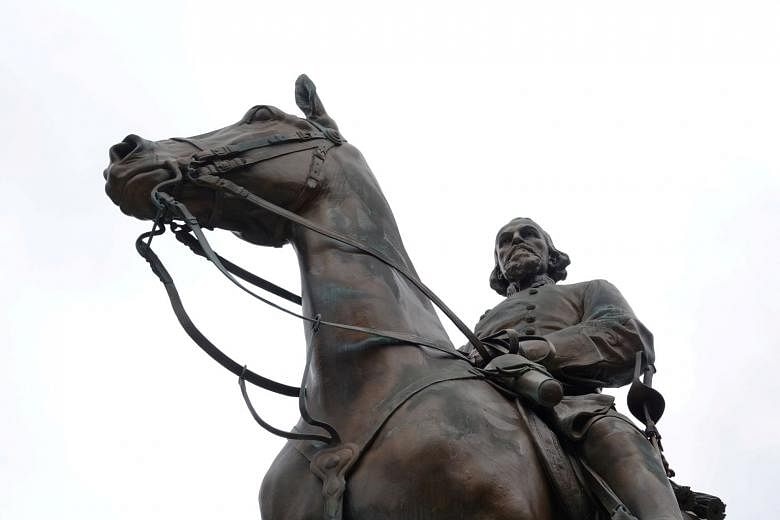MEMPHIS, TENNESSEE (NYTIMES) - The City Council here voted Wednesday to sell two city parks with Confederate monuments, clearing the way for two statues to be removed before the city commemorates the 50th anniversary of the assassination of the Rev. Dr. Martin Luther King Jr.
Mayor Jim Strickland first announced the sales of Health Sciences Park and Memphis Park on Twitter.
"History is being made in Memphis tonight," he said at a news conference later in the evening.
Health Sciences Park had a statue of Nathan Bedford Forrest, a Confederate general and an early member of the Ku Klux Klan, which was removed around 9 p.m. local time. Memphis Park has a statue of Jefferson Davis, the president of the Confederacy during the Civil War.
Within an hour of the City Council's vote, police officers and cranes were deployed to Health Sciences Park, where officers cordoned off the area around the Nathan Bedford Forrest statue.
A crowd of about 100 people, many ignoring officers' warnings to avoid Union Avenue, a central thoroughfare, gathered across the street in anticipation of the statue's removal.
Just after 9 p.m., the crane began to lift the statue into the air, the horse and rider dangling above the now-bare pedestal. Onlookers cheered. Someone yelled, "Now drop it!" Others chanted: "Hey hey! Ho ho! That racist statue has got to go!"
The crowd continued to celebrate as workers maneuvered the statue onto the bed of a flatbed truck, with horse and rider facing forward.
Kyle Veazey, a spokesman for Strickland, wrote on Twitter that the statue had been lifted at 9:01 p.m., an apparent nod to the city's 901 area code. One of the groups that led the movement to remove the statues was called Take 'Em Down 901.
"Just to finally get to this moment is overwhelming," Tami Sawyer, a leader of the group, said.
"I looked Nathan Bedford in the eyes and shed a tear for my ancestors," she said, recalling the history of African-Americans from slavery to modern incarceration.
Bruce McMullen, the chief legal officer for the city, said in an interview on Wednesday night that the parks had been sold to Memphis Greenspace, a nonprofit led by Van D. Turner Jr., a Shelby County commissioner.
The nonprofit seems to have been created expressly for the purpose of buying the parks: It filed its incorporation papers in October, Strickland said. Turner did not immediately return a request for comment.
The city sold Health Sciences Park in its entirety, McMullen said, and it sold its interest in an easement in Memphis Park. Each was sold for US$1,000, he said.
The transfer of the parks to private ownership effectively allowed the city to skirt the Tennessee Heritage Protection Act, a state law that prohibits the removal, relocation or renaming of memorials on public property.
In October, the Tennessee Historical Commission, a state agency that oversees the law, voted to deny the city's application for a waiver of the law regarding the two statues, the television station WREG reported.
The move to remove the statues comes not only as Memphis prepares for the 50th anniversary of the death of King, who was assassinated on April 4, 1968, while visiting the city, but also amid a sweeping national debate about the significance of Confederate monuments and whether their removal would be an erasure of history or a righting of past wrongs.
Around the country, cities have removed symbols ranging from the Confederate flag, to memorials of rank-and-file Confederate soldiers, to statues of prominent generals including Robert E. Lee and Stonewall Jackson.
Rep. Steve Cohen, D-Tenn., praised the City Council's move, calling the statues "not representative of Memphis today" and "an affront to most of the citizens of Memphis."
"As we approach the 50th anniversary of the assassination of Dr. Martin Luther King, it's important that these relics of the Confederacy and defenders of slavery don't continue to be displayed in prominent places in our city," Cohen said in a statement.
McMullen said another motivation for removing the statues was ensuring that they would not create an "incendiary type of environment" during the city's commemorations of King in April.
He dismissed the criticism of some groups, including the Sons of Confederate Veterans, who had accused the city of willfully violating state law. He said the city had been weighing the sale of the parks to a private group for a year.
"We've always felt that we had a right to sell city property. We have in the past, and we probably will in the future," McMullen said. "And what we did was perfectly legal and right."
At the news conference, Strickland echoed McMullen's comments. The mayor said the City Council had undertaken a long, complex process to ensure that the handoff was done legally, including passing a law in September that allowed the city to sell the parks for less than their market value.
But he also invoked the violent protests in Charlottesville, Virginia, in August as the "sea change" that spurred those efforts to success. One woman was killed after white supremacists rallied in Charlottesville to protest the planned removal of a statue of Robert E. Lee.
In the days after the deadly rally, Strickland said, "we saw an avalanche of support come together behind our efforts."
"But this day, this day should be more about where we go from here," he said. "I want to say this loud and clear. Though some of our city's past is painful, we are all in charge of our city's future."

